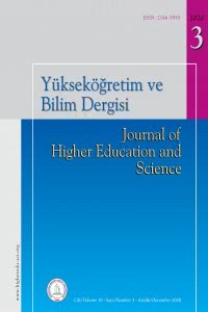Üniversite Öğrencilerinin Üniversite ve Kent Memnuniyetinin Değerlendirilmesi: Türkiye’den Bir Örnek
memnuniyet, kent memnuniyeti, üniversite memnuniyeti, üniversite öğrencileri, gençlik sosyolojisi
Evaluating Students’ Satisfaction with Their University and City: A Case in Turkey
satisfaction, city satisfaction, university satisfaction, university students, youth sociology,
___
- Arslan, F. (2016). Üniversite öğrencilerinin şehirle kurduğu ekonomik ve sosyal ilişkilerden memnuniyet analizi: Sivas Cumhuriyet Üniversitesi örneği. İnsan ve Toplum Bilimleri Araştırmaları Dergisi, 5(4), 1103-1120. https://doi.org/10.15869/itobiad.60715
- Azzone, G., & Soncin, M. (2020) Factors driving university choice: a principal component analysis on Italian institutions, Studies in Higher Education, 45(12), 2426-2438. https://doi.org/10.1080/03075079.2019.1612354
- Bean, J. P., & Bradley, R. K. (1986). Untangling the satisfaction-performance relationship for college students. Journal of Higher Education, 57(4),393-412. https://doi.org/10.2307/1980994
- Bourdieu, P., & Passeron, J.C. (1979). The inheritors: French students and their relation to culture. University of Chicago Press.
- Cubillo, J. M., Sánchez, J., & Cerviño, J. (2006). International students’ decision-making process. International Journal of Educational Management, 20(2), 101–115. https://doi.org/10.1108/09513540610646091
- Drewes, T., & Michael, C. (2006). How Do Students Choose a Unıversıty: An Analysis of Applications to Universities in Ontario, Research in Higher Education, 47(7), 781-800. https://doi.org/10.1007/s11162-006-9015-6
- Elliott, K. M., & Healy, M. A. (2001). Key factors influencing student satisfaction related to recruitment and retention. Journal of Marketing for Higher Education, 10(4), 1-11. https://doi.org/10.1300/J050v10n04_01
- Elliott, K. M., & Shin, D. (2002). Student satisfaction: An alternative approach to assessing this important concept. Journal of Higher Education Policy and Management, 24(2), 197-209. https://doi.org/10.1080/1360080022000013518
- Eriş, H. M., & Anıl, D. (2016). Üniversite Öğrencilerinin Yaşam Kalitesi Düzeylerinin Bazı Değişkenlere Göre İncelenmesi. Hacettepe Üniversitesi Eğitim Fakültesi Dergisi, 31(3): 491-504. https://doi.org/10.16986/HUJE.2015014183
- Ergun, C. (2014). Üniversite ve kent ilişkisi üzerine görüşler: Mehmet Akif Ersoy Üniversitesi örneği. Mehmet Akif Ersoy Üniversitesi Eğitim Fakültesi Dergisi, 1(31), 216-237. https://doi.org/10.21764/efd.05947
- Erol, M., & Yıldırım, İ. (2016). Yükseköğrenim Yaşam Doyumu Ölçeğinin geliştirilmesi. Eğitimde Kuram ve Uygulama, 12(1), 221-243.
- Gay, L.R., Mills, G.E., & Airasian, P.W. (2012). Educational Research: Competencies for Analysis and Application. 10th Edition, Pearson, Upper Saddle River.
- Hahn, M. B., Kemp, C., Ward-Waller, C., Donovan, S., Schmidt J. I. & Bauer S. (2020) Collaborative climate mitigation and adaptation planning with university, community, and municipal partners: a case study in Anchorage, Alaska, Local Environment, 25(9), 648-665, https://doi.org/10.1080/13549839.2020.1811655
- Hanssen, T.E.S., & Solvoll, G. (2015), The importance of university facilities for student satisfaction at a Norwegian University. Facilities, 33(13/14), 744-759. https://doi.org/10.1108/F-11-2014-0081
- Insch, A., & Florek, M. (2008). A great place to live, work and play: Conceptualising place satisfaction in the case of a city’s residents. Journal of Place Management and Development, 1(2), 138–149. https://doi.org/10.1108/17538330810889970
- Insch, A. & Sun, B. (2013). University students’ needs and satisfaction with their host city. Journal of Place Management and Development, 6 (3), 178-171. https://doi.org/10.1108/JPMD-03-2013-0004
- Karadağ, E., & Yücel, C. (2020). Öğrenci dostu üniversite şehirleri. Üniversite Araştırmaları Laboratuvarı Yayınları.
- Krejcie, R. V., & Morgan, D. W. (1970). Determining sample size for research activities. Educational and psychological measurement, 30(3), 607-610. https://doi.org/10.1177/001316447003000308
- Kumar, R. (2018). Research methodology: A step-by-step guide for beginners. Sage.
- Lefebevre, H. (1996). Writings on Cities (E. Kofman & E. Lebas Eds. & Trans.) Blackwell.
- MORI. (2001). Student Living Report 2001. UNITE, MORI, Bristol.
- Nuseir, M. T., & El Refae, G. A. (2021). Factors influencing the choice of studying at UAE universities: an empirical research on the adoption of educational marketing strategies. Journal of Marketing for Higher Education, https://doi.org/10.1080/08841241.2020.1852467
- Oliver, R. L., & DeSarbo, W. S. (1989). Processing satisfaction response in consumption: A suggested framework and research proposition. Journal of Consumer Satisfaction, Dissatisfaction, and Complaining Behavior, 2, 1-16.
- Roostika, R. (2017). The role of city and host university images on students’ satisfaction with the assigned destination. Review of Integrative Business and Economics Research, 6(1), 250–261.
- Sankır, H., & Sankır, Ş. (2017). Toplumsal değişim açısından üniversite-kent etkileşimi ve algısı: Bülent Ecevit Üniversitesi örneği. Yükseköğretim ve Bilim Dergisi, (3), 473-483.
- Santini, F. D. O., Ladeira, W. J., Sampaio, C. H., & da Silva Costa, G. (2017). Student satisfaction in higher education: a meta-analytic study. Journal of Marketing for Higher Education, 27(1), 1-18. https://doi.org/10.1080/08841241.2017.1311980
- Sevier, R. A. (1996). Those important things: What every college president needs to know about marketing and student recruitment. College and University,71(4), 9-16.
- Situmorang, R., Antariksa, S., & Wicaksono, A. D. (2020). The Perception Of Stakeholders On Studentification In Malang City, Indonesia. Internatıonal Journal Of Scıentıfıc & Technology Research,9(2), 3028-3033. http://www.ijstr.org/final-print/mar2020/The-Perception-Of-Stakeholders-On-Studentification-In-Malang-City-Indonesia.pdf
- Taşcı, D., Gökalp, E., Genç-Kumtepe E., Kumtepe A.T., & Toprak, E. (2011). Kentin üniversite algısı: Anadolu Üniversitesi ve Eskişehir örneği. Amme İdaresi Dergisi, 44(2), 131 - 146.
- Tuysuz, S., Gürel, M. E., & Gülmez, R. (2020). Kent Hakkı ve Toplumsal Cinsiyet Bağlamında Mekânın Siyaseti: Erzincan KYK Yurtları Örneği. Journal of Economy Culture and Society, (61), 85-105. https://doi.org/10.26650/JECS2019-0086
- Weerasinghe, I. S., & Fernando, R. L. (2017). Students' satisfaction in higher education. American Journal of Educational Research, 5(5), 533-539. . https://doi.org/10.12691/education-5-5-9
- Yakut, S. (2021). Üniversite öğrencilerinde memnuniyet algısının dinamikleri: Bozok Üniversitesi İlahiyat Fakültesi öğrencileri üzerine bir araştırma. Journal of International Social Research, 14(78). 311-328.
- Yıldırım, F.B., Güneri, O.Y. ve Aydın, Y.Ç. (2015). Üniversite öğrencilerinin memnuniyet düzeyi ve ilişkili değişkenler. Eğitimde Kuram ve Uygulama, 11(2), 521-533. https://doi.org/10.17244/eku.83648
- ISSN: 2146-5959
- Yayın Aralığı: 3
- Başlangıç: 2011
- Yayıncı: Bülent Ecevit Üniversitesi (Önceden Zonguldak Karaelmas Üniversitesi)
Ebelik Alanında Yapılan Lisansüstü Tezlerin İçerik Analizi
Yasemin ERKAL AKSOY, Ayşe Nur ATAŞ, Sema YILMAZ
KKTC’de Covid-19 Salgını Bağlamında Akademisyenlerin Uzaktan Eğitime İlişkin Metaforik Algıları
Ayça KAYA, Cemaliye MAHMUTOĞLU
Üniversite Öğrencilerinin Üniversite ve Kent Memnuniyetinin Değerlendirilmesi: Türkiye’den Bir Örnek
Bilimsel Kongrelerin Verimliliği ve Akademisyenlerin Anlam Dünyasındaki Yeri
Yılmaz TONBUL, Figen ATA ÇİĞDEM
Matematiksel İlişkilendirme Türlerinin Sınıf İçi Yansımalarının İncelenmesi
Psikolojik Sağlamlığı Değerlendirme Ölçeği: Türkçe Versiyonuna İlişkin İlk Psikometrik Bulgular
Tuğba TÜRKKAN, Kenan BÜLBÜL, Hatice ODACI
Emine Tuğba TOPÇU, Ebru EREK KAZAN, Sibel KÜÇÜK, Yasemin MURAT, Büşra ALPASLAN, Hayriye MOLOZOĞLU, Birgül ÖZKAN
Doçentlik Başvuru ve Değerlendirme Sürecinde Yaşanan Sorunlar: Fenomenolojik Bir Araştırma
Nagihan İLASLAN, Ayşegül AÇIL, Selin KESKİN KIZILTEPE, Ayşe DEMİRAY
